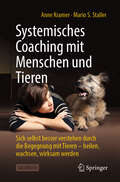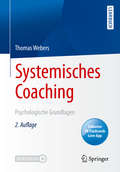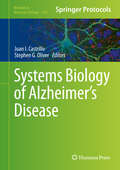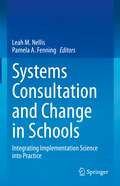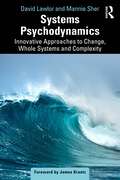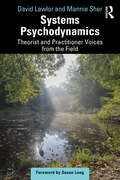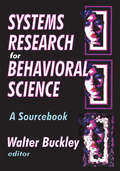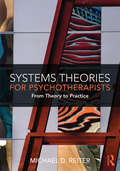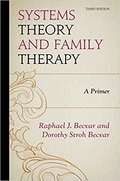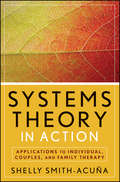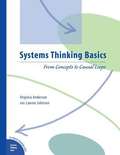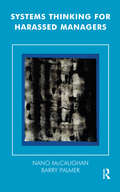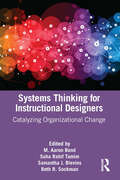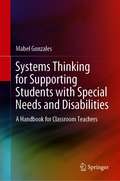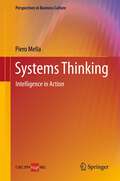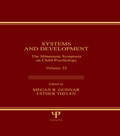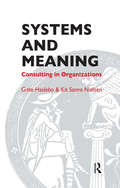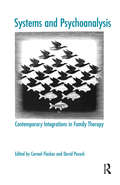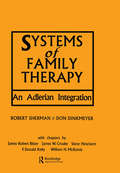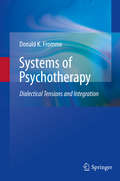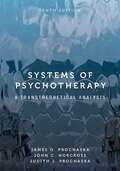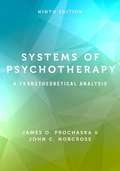- Table View
- List View
Systemisches Coaching mit Menschen und Tieren: Sich selbst besser verstehen durch die Begegnung mit Tieren – heilen, wachsen, wirksam werden
by Anne Kramer Mario StallerDieses Buch haben wir für dich geschrieben, damit du deine eigenen Potentiale und Ressourcen entdecken und weiterentwickeln kannst. Du hast vielleicht die Sinnhaftigkeit in deinem Tun verloren oder steckst in zwischenmenschlichen Konflikten oder ungesunden Dynamiken fest. Zeit, aus neuen Blickwinkeln auf dich und deine Systeme zu schauen! Auch Coaches und Therapeut:innen, die systemisch und tiergestützt mit ihren Klient:innen arbeiten (möchten), werden profitieren. Wir alle kennen dieses Tunnel-Gefühl: wir hängen in einer Situation fest, fühlen uns unwohl, sehen keinen Ausweg. Veränderungsversuche waren bislang nicht erfolgreich. Unsere Erfahrung zeigt: Um nicht wieder in alte Muster zu verfallen, müssen die größeren umgebenden Strukturen in den Prozess miteinbezogen werden. Und um unsere eigene Wirksamkeit in den Strukturen zu erkennen, brauchen wir manchmal ganz neue Perspektiven – diese können uns nicht nur andere Menschen, sondern auch Tiere bieten. Die wertvolle Kombination aus systemischem Coaching und der Interaktion mit Tieren (auch mit deinem eigenen Tier zu Hause) stellen wir dir hier vor. Anhand von acht Fallbeispielen aus unterschiedlichen Lebensfeldern wie „Arbeit“, „Familie“, „Freundeskreis“ oder „Schule“ werden wir die großen Themen, die uns regelmäßig begegnen, veranschaulichen: Es geht um Nähe und Distanz, um Kontrolle und Vertrauen, Macht und Ohnmacht, Anspannung und Entspannung, Selbst und Andere, Festhalten und Loslassen, Freude und Trauer, und um das „Sein“ und das „Werden“. Dabei werden wir dir Ideen und Impulse mitgeben, um diese Themen für dich selbst durch neue Beobachtungsbrillen zu betrachten. Aus Erfahrung wissen wir: Dies ist ein ganz anderer Ansatz als das, was unsere Klient:innen bisher ausprobiert haben. Unser Ansatz ist nicht-linear: Du musst nicht das ganze Buch chronologisch lesen; du kannst dir die Themen herauspicken, die dich am meisten interessieren. Es erwarten dich viele Beispiele aus dem realen Leben, neue Denk- und Beobachtungsansätze sowie zahlreiche konkrete Impulse zum Transfer in deine eigene Lebenssituation.
Systemisches Coaching: Psychologische Grundlagen
by Thomas WebersDieses Lehrbuch gibt eine kompakte und übersichtliche Einführung ins Business-Coaching. Dies geschieht einerseits auf Basis der modernen Systemtheorie, deren Relevanz für Coaching erschlossen wird. Andererseits werden die zentralen Grundlagen der wissenschaftlichen Psychologie für Coaching herausgearbeitet und in Anwendung gebracht. In dieser Kombination erweist sich Coaching als evidenzbasierte professionelle Dienstleistung – und dieses Werk als geeignete Lektüre für Studierende und Coaching-Praktiker gleichermaßen.
Systemisches Fragen: Professionelle Fragekompetenz für Führungskräfte, Berater und Coaches (essentials)
by Andreas PatrzekDas essential stellt praxisnah dar, wie durch Fragekompetenz erfolgreiches Führen, Beraten und Coachen gelingt. Es bringt die wesentlichen Definitionen und Techniken auf den Punkt, vermittelt die theoretischen Grundlagen und Strategien und zeigt die Umsetzung. Orientiert an zentralen Merkmalen des systemischen Ansatzes wird die Kunst der Fragekompetenz verständlich dargestellt. Mit zahlreichen konkreten Beispielen und Formulierungshilfen für die tägliche Praxis.
Systemisches Fragen: Professionelle Fragetechnik für Führungskräfte, Berater und Coaches (essentials)
by Andreas PatrzekDas kompakte Buch stellt praxisnah dar, mit welchen Fragetechniken erfolgreiches Führen, Beraten und Coachen gelingt. Es bringt die wesentlichen Definitionen und Techniken auf den Punkt, vermittelt die theoretischen Grundlagen und Strategien und zeigt die Umsetzung. Orientiert an zentralen Merkmalen des systemischen Ansatzes wird die Kunst der Fragetechnik verständlich dargestellt. Mit zahlreichen konkreten Beispielen und Formulierungshilfen für die tägliche Praxis.
Systemisches Fragen: Professionelle Fragetechnik für Führungskräfte, Berater und Coaches (essentials)
by Andreas PatrzekDas essential stellt praxisnah dar, mit welchen Fragetechniken erfolgreiches F#65533;hren, Beraten und Coachen gelingt. Es bringt die wesentlichen Definitionen und Techniken auf den Punkt, vermittelt die theoretischen Grundlagen und Strategien und zeigt die Umsetzung. Orientiert an zentralen Merkmalen des systemischen Ansatzes wird die Kunst der Fragetechnik verst#65533;ndlich dargestellt. Mit zahlreichen konkreten Beispielen und Formulierungshilfen f#65533;r die t#65533;gliche Praxis.
Systems Biology of Alzheimer's Disease
by Juan I. Castrillo Stephen G. OliverAlzheimer's disease (AD) and many other neurodegenerative disorders are multifactorial in nature, involving a combination of genomic, epigenomic, network dynamic and environmental factors. A proper investigation requires new integrative Systems Biology approaches, at both the experimental and computational level. The interplay of disease mechanisms and homeostatic networks will underlie the time of onset and rate of progression of the disease. This book addresses such an integrated approach to AD. It aims to present Systems Biology, including both experimental and computational approaches, as a new strategy for the study of AD and other multifactorial diseases, with the hope that the results will translate into more effective diagnosis and treatment, as well as improved public health policies. Written for the highly successful Methods in Molecular Biology series, practical and cutting-edge, Systems Biology of Alzheimer's Disease is intended for post-graduate students, post-doctoral researchers and experts in different fields with an interest in comprehensive Systems Biology strategies applicable to AD and other complex multifactorial diseases (including other neurodegenerative diseases and cancers). This book aims to complement other excellent volumes and monographs on AD that cover fundamental, physiological or medical aspects of the disease.
Systems Consultation and Change in Schools: Integrating Implementation Science into Practice
by Leah M. Nellis Pamela A. FenningThis book explores the ways in which systems (organizational) consultation may be applied to school roles and functions as part of an overall systems change process. Using an implementation science framework grounded in systems/organizational consultation research, the volume details how school reform or improvement may be facilitated. School-based case studies illustrate the application of implementation science to systems change efforts in schools and districts across the United States. Each case study describes the implementation science steps taken to deliver a school-based innovation at the systems level. The book discusses implementation science theory combined with real-world examples of its use in planning for, implementing, and engaging in ongoing evaluation of a systems change effort. Key areas of coverage include:Implementation science in educational settings.Key stakeholder roles in school-based systems change.Implementing and evaluating systems change in schools.Teacher-student mediation to reduce conflict and ensure effective school discipline and behavior practices.District-level processes and supports for English Language Learners.Mental health screening and social-emotional well-being of students. Systems Consultation and Change in Schools is an essential resource for researchers, professors, and graduate students as well as scientist-practitioners, school-based practitioners, and clinicians across such disciplines as school administration and leadership, school and clinical child psychology, social work, public health, teaching and teacher education, educational policy and practice, and all interrelated fields.
Systems Psychodynamics: Innovative Approaches to Change, Whole Systems and Complexity
by Mannie Sher David LawlorIn the second of this three-volume series, the authors expand on the theory and practice of systems psychodynamics – which integrates psychoanalytic thinking, open systems theory and complexity theory – in its applications to consultancy work in organisations and wider social contexts. Multidisciplinary and multitheoretical in nature, the systems psychodynamics paradigm develops from the understanding that no single theory or approach explains the complex nature of organisational systems. Replete with explanations of key theories, practical guidance and exercises, this book demonstrates how systems psychodynamics can be used by consultants to plan and put into action organisational changes in four main areas: change planning and management; action research and evaluation; leadership and whole systems; and professional development and next steps. In light of systems psychodynamics, rather than functioning as a leader of change processes, the role of an organisational development consultant is one of providing containment, understanding and facilitation for others to take up their leadership roles responsibly in their change processes. With a focus on practical application in real situations, this book will be invaluable for psychoanalysts, managers, policymakers, consultants and researchers in a wide range of professional and clinical settings.
Systems Psychodynamics: Theorist and Practitioner Voices from the Field
by Mannie Sher David LawlorThrough a series of in-depth interviews with Tavistock thinkers across three generations, this volume illustrates the practice and application of the systems psychodynamics paradigm to organisational development consultancy, research and training. Across 28 stimulating interviews with a group of international consultants, interviewees present a critical appraisal of the systems psychodynamics paradigm and its application to present-day social and organisational difficulties. By using a narrative interpretive method, the interviewers attend to the historical, psychosocial and biographical dynamics of the interviewees’ approaches and methods of work, and address several areas of organisational consultancy. These include organisational design, the division of labour, levels of authority and reporting relationships; the nature of work tasks, processes and activities; primary tasks and the inevitable unconscious dynamics within systems and individuals. The multi-disciplinary approaches of the interviewees will interest managers, policymakers, consultant practitioners and researchers to understand the variety of applications of systems psychodynamics methodologies.
Systems Research for Behavioral Science: A Sourcebook
by Walter BuckleySystems Research for Behavioral Science will be of interest to those in any discipline concerned with developments in science. It is addressed principally to the student of human behavior as that study is approached from the social side.Previously, the study of human behavior was the general area of science that had been slowest to respond to the exciting challenge of the modern systems outlook. Yet it is behavioral science that stands to gain the most from insights into the workings of more complex systems.The editor presents not only a fair selection of systems research in behavioral science, but also provides an extensive selection of important statements of general principles, including several already considered classics. Hence, this sourcebook may function in part as a principles text, exposing the initiate to original pioneering statements as well as later work inspired by them, and alerting the sizeable number of underexposed scholars who are over-familiar with the few terms such as feedback, boundary, input, and output, that there are much greater depths to plumb than meet the eye in semi-popular accounts of cybernetics.This volume is an overview of thinking that reflects a trend toward the system point of view. Some of the chapters are philosophical: they discuss the significance of the trend as a development in the contemporary philosophy of science. Some are inevitably detailed and technical. Still other chapters discuss the relevance of concepts that are central in the system approach, to particular fields of research. The picture that emerges is far from that of a unified theory. It is an open question whether much progress can be made by attempts to construct a "unified theory of systems" on some rigorous axiomatic base.
Systems Theories for Psychotherapists: From Theory to Practice
by Michael D. Reiter<p><i>Systems Theories for Psychotherapists</i> explores three key theories that underpin many of the models of psychotherapy: general systems theory, natural systems theory, and language systems theory. The book presents the aesthetics (how to see and understand what is happening) and the pragmatics (what to do in the therapy room) behind each theory. It also explores how therapists can successfully conceptualize the problems that clients bring to therapy, offering a range of contemporary examples to show how each theory can be applied to practice. <p>Starting with an introduction to systems theories, the book then delves into cybernetics, interactional systems, natural systems, constructivist theory, and social construction theory. Each chapter uses a distinctive case example to help clinicians to better understand and apply the theories to their own therapeutic setting. Woven throughout the book are three helpful learning tools: "Applying Your Knowledge," "Key Figure," and "Questions for Reflection," providing the reader with the opportunity to critically engage with each concept, consider how their own world view and preconceptions can inform their work with clients, and challenging them to apply prominent systems theories to their own practice. <p><i>Systems Theories for Psychotherapists</i> is a clear and valuable text for undergraduate and graduate students in mental health programs, including counseling, marriage and family therapy, social work and clinical psychology, as well as for all practicing clinicians.</p>
Systems Theory and Family Therapy: A Primer
by Dorothy Stroh Becvar Raphael J. BecvarThis book provides an overview of the basic concepts of a systems theoretical perspective using families and family therapy as examples and illustrations of their application in professional practice. This meta-perspective focuses on viewing problems in context. <P><P>The difference between first-order and second-order cybernetics is explicated. Readers then are invited to see themselves as parts of the systems with which they are working consistent with a second-order cybernetics perspective. Along the way a difference between modernism and post-modernism as well as constructionism and social constructionism also are described. In addition, theories of individual and family development are presented with implications for their use in family therapy. The book concludes with more than 100 examples of how the meta-perspective of systems theory can be used in work with families.
Systems Theory in Action
by Shelly Smith-Acuña"Smith-Acuña illuminates the structural hierarchy, roles, and boundaries that give a system structure. The relationship between parts and wholes is both simple and profound, and particularly important in looking at systems structure. These morsels of wisdom are good examples of Smith-Acuña's grace as a systems theory tour guide: one moment she's digging deeper into the nuances among the theories, the next moment she's simplifying without dumbing down, but in a manner that is enormously liberating. We enjoy the fun, full, and informed journey with her." -Frank S. Pittman III, MDA practical presentation of systems theory as a fundamental model for clinical practiceValuable for seasoned mental health professionals as well as those in training, Systems Theory in Action presents systems theory-the unifying principles surrounding the organization and functioning of systems-as it applies to individual, couples, and family therapy.This innovative book explores systems theory as an effective model for general mental health practice. It examines the role systems theory can play, specifically in understanding clients' presenting problems in context, within the various systems and subsystems in which the problems are embedded.Filled with realistic clinical stories illustrating relevant concepts that tie theory to technique, Systems Theory in Action takes an in-depth look at: Systems theory as a solid guide through the dynamic process of psychotherapy The multilayered value of observing human interactions through a systems view Systemic thinking, its core components, and how it serves to reveal a "big picture" view of clients and their presenting problemsSystems Theory in Action is a unique contribution to the field, translating the technical terminology of general systems thinking into common, everyday language.
Systems Thinking Basics: From Concepts to Causal Loops
by Virginia Anderson Lauren Johnson<p>Systems Thinking Basics is a self-study, skill-building resource designed to introduce you to the power of systems thinking tools. With an emphasis on behavior over time graphs and causal loop diagrams, this workbook guides you step by step through: Recognizing systems and understanding the importance of systems thinking; Interpreting and creating behavior over time graphs and causal loop diagrams; Applying and practicing systems thinking day-to-day. <p>Each of the book's six main sections contains a wealth of examples from the business world, as well as learning activities that reinforce concepts and provide you with the opportunity and space to practice. An array of appendices offers: Extra practice activities; A summary of key points and suggested responses to the learning activities; A table showing the "palette" of systems thinking tools available; A glossary of systems thinking terms; A list of additional resources; A summary of the systems archetypes. <p>The many diagrams within the book clarify concepts and visually reinforce key principles. Systems Thinking Basics is ideal for aspiring systems thinkers eager to try their hand at using these powerful tools</p>
Systems Thinking for Harassed Managers (The Systemic Thinking and Practice Series)
by Nano McCaughan Barry PalmerThis book describes the processes that shape organisational life and shows how managers can work together to help one another to work out their problems and develop their skills. The authors draw on their experiences of working with managers and in the group relations field.
Systems Thinking for Instructional Designers: Catalyzing Organizational Change
by M. Aaron BondSystems Thinking for Instructional Designers offers real-world cases that highlight how designers foster continuous improvement and manage change efforts across organizational contexts. Using a systems thinking approach, each case describes a holistic process that examines how a set of interdependent elements can be analyzed and coordinated to influence change. Instructional designers, faculty, program directors, digital learning leaders, and other development specialists will learn how systems thinking can solve authentic, real-world challenges. The book’s rich narratives cover both successes and failures of meaningful growth, paradigm shifts, and large-scale problem-solving in a variety of settings, including education and industry.
Systems Thinking for Supporting Students with Special Needs and Disabilities: A Handbook for Classroom Teachers
by Mabel GonzalesThis book provides school leaders and teachers with research-based theories and models on systems thinking and on inclusive education. It offers the ‘why’, ‘what’ and ‘how’ of inclusive teaching and learning with specific references to a range of special needs. It discusses topics such as a sustainable approach to inclusion, differentiation of learning programs and activities, and a range of assessment approaches to support teaching and learning. The book also presents the social aspects of inclusion and encourages teachers and school leaders to focus not only on the academic aspects of education but the social and emotional growth of the student. It highlights the value of parent input and promotes the forming of parent partnership to enhance student learning and wellbeing. Part One of the book gives practical suggestions on how school leaders can apply systems thinking to mobilise the school and school community to contribute to the ideals of Education For All. Part Two discusses a range of disabilities with each chapter covering the medical definitions and characteristics of the condition, the challenges faced by the student, their parents and teachers, and presents evidence-based strategies and classroom management tips to help teachers with their everyday classroom needs. The book helps to heighten school leaders’ awareness on how to use systems thinking to mobilise the school community to action. It strengthens teachers' confidence and builds their capacity in providing all students with access to flexible learning choices to help them achieve educational goals and develop a sense of belonging.
Systems Thinking: Intelligence in Action
by Piero MellaThe core belief underlying this book is that the most useful and effective models to strengthen our intelligence are system ones, developed following the logic of Systems Thinking. Such models can explore complexity, dynamics, and change, and it is the author's view that intelligence depends on the ability to construct models of this nature. The book is designed to allow the reader not only to acquire simple information on Systems Thinking but above all to gradually learn the logic and techniques that make this way of thinking an instrument for the improvement of intelligence. In order to aid the learning and practice of the Systems Thinking discipline, the author has abandoned a rigid formal language for a more discursive style. He writes in the first person, with an ample number of citations and critical analyses, and without ever giving in to the temptation to use formal mathematics.
Systems and Development: The Minnesota Symposia on Child Psychology, Volume 22 (Minnesota Symposia on Child Psychology Series)
by Megan R. Gunnar Esther ThelenThis volume covers the 22nd Annual Minnesota Symposia on Child Psychology. The theme of the conference was the use of a systematic approach to the study of development. An analysis of systems theory, its applications to the study of development, its benefits, and its drawbacks are considered. The contributors, among the leaders in this field, discuss the application of systems concepts to the analysis of core issues in areas as diverse as motor and social development.
Systems and Meaning: Consulting in Organizations (The Systemic Thinking and Practice Series)
by Gitte Haslebo Kit Sanne NielsenThis book looks at organisational problems occurring in a particular context, and clearly traces the way problems arise out of relations amongst the different parts of the larger system. It also pursues the meanings that these problems have for individuals and organisations alike. The authors, who are both practitioners experienced in working with organisations, show how their ideas can be implemented in different settings.
Systems and Psychoanalysis: Contemporary Integrations in Family Therapy (The Systemic Thinking and Practice Series)
by David Pocock Carmel FlaskasThis book demonstrates how accomplished clinicians can promote the emergence of a richness and creativity that appeals to practitioners of systemic family therapy, not least because of the immediate relevance and usefulness of the ideas. It will be useful to the field of psychotherapy.
Systems of Family Therapy: An Adlerian Integration
by Robert Sherman Don DinkmeyerFirst published in 1987. Routledge is an imprint of Taylor & Francis, an informa company.
Systems of Psychotherapy
by Donald K. FrommePsychotherapy today encompasses a broad spectrum of approaches that focus to a varying extent on psychophysiological, behavioral, environmental, or other aspects of human problems. Despite the overlap that exists between many of these approaches, there is no method that integrates more than a few of these aspects. It is therefore important to understand the inherent advantages and disadvantages of each therapy system, and how each helps people to solve their problems. Systems of Psychotherapy: Dialectical Tensions and Integration provides an in-depth overview of the major therapeutic systems in practice today and outlines the philosophical differences and opportunities for integration among them. This volume also considers the new ideas and approaches to therapy stemming from the postmodernist and integrative movements. By highlighting the unique merits of each system, readers are encouraged to combine factors present in the various systems to create a comprehensive view of human nature and functioning that will improve therapeutic outcomes. Topics covered in this volume include: *Empirical foundations of psychotherapy *Treatment planning and the initial interview *Psychopharmacology *Cognitive-Behavioral interventions *Humanistic approaches *Interpersonal approaches *Family systems and couples approaches *Ecosystemic interventions Systems of Psychotherapy is an educational text which spans historical and contemporary issues in psychotherapy and is an ideal reference for students of clinical, counseling, and school psychology, psychiatric residents, and graduate students in clinical social work.
Systems of Psychotherapy: A Transtheoretical Analysis
by James O. Prochaska John C. Norcross Judith J. ProchaskaComprehensive, systematic, and balanced, Systems of Psychotherapy uses a wealth of clinical cases to help readers understand the major psychotherapies, including psychodynamic, existential, experiential, interpersonal, exposure, behavioral, cognitive, third wave, systemic, multicultural, and integrative. The tenth edition of this landmark text thoroughly analyzes 15 leading systems of psychotherapy and briefly surveys another 32, providing students and practitioners with a broad overview of the discipline. The book explores each system's theory of personality, theory of psychopathology, and resulting therapeutic process and relationship. Through these explorations, the authors clearly demonstrate how psychotherapy systems agree on the processes producing change while diverging on the elements in need of change. Additionally, the authors present the central limitations, outcome research, and future directions of each system of psychotherapy. This tenth edition features a reconfigured chapter on positive psychological treatments, expanded coverage of the Unified Protocol and transdiagnostic personalizing, new self-reflection exercises, additional examples of child and adolescent therapy, and more than 500 new references, recommended readings, and web resources.
Systems of Psychotherapy: A Transtheoretical Analysis
by James O. Prochaska; John C. NorcrossComprehensive, systematic, and balanced, Systems of Psychotherapy uses a wealth of clinical cases to help readers understand a wide variety of psychotherapies - including psychodynamic, existential, experiential, interpersonal, exposure, behavioral, cognitive, third wave, systemic, multicultural, and integrative. The ninth edition of this landmark text thoroughly analyzes 15 leading systems of psychotherapy and briefly surveys another 32, providing students and practitioners with a broad overview of the discipline. <p><p> The book explores each system's theory of personality, theory of psychopathology, and resulting therapeutic process and therapy relationship. Through these explorations the authors clearly demonstrate how psychotherapy systems agree on the processes producing change while diverging on the elements in need of change. Additionally, the authors present cogent criticisms of each approach from cognitive-behavioral, psychoanalytic, humanistic, cultural, and integrative perspectives. This ninth edition features updated meta-analytic reviews of the effectiveness of each system, new sections on Lacanian analysis, mentalization therapy, and psychotherapy with gender nonconforming people, as well as new sections and updates throughout the text.
